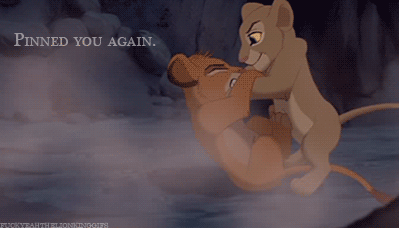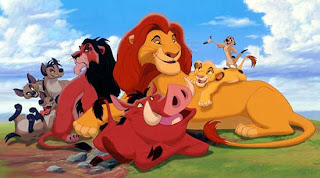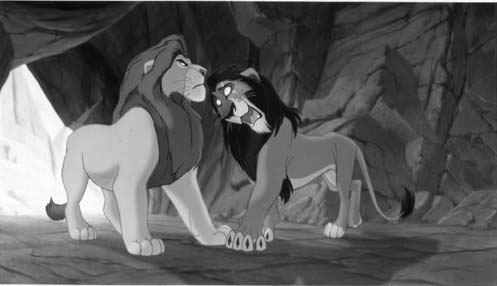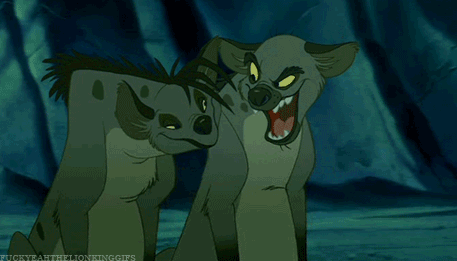 |
| Nala to Simba: “Pinned you again.” |
Overall FeministDisney Rating: **, 2/4 stars (see below for specific categories that feed into this)
The Lion King is an interesting movie to pick apart. I think when it comes to anthropomorphized casts, it’s almost more difficult, at first, to examine it critically in terms of how it portrays humans. After all, when you think “Feminism” + “Disney,” who thinks to critique The Lion King? I didn’t, at first.
But truth be told: there is much to critique here.
I should say first, let’s throw the whole “But this is how lions act” argument out the window. Lions are not actually “kings” of all animals; they do not actually get along with prey when they’re feeling like singing a song, or learn to eat bugs from them; when (male) lions become subadults, they have to leave their pride, and no, they can never come back. Etc., etc., etc.
So none of this “Disney just portrayed it that way because it’s that way in real life” ish. This isn’t the National Geographic Channel.
 |
| One big, happy family? |
So anyhow.
It’s very noticeable in this movie that male characters take the center stage, and female characters take a backseat to the action. Simba, Mufasa, Scar, Rafiki, Zazu, Timon, Pumbaa (these are all characters that take up a significant amount of screen time) versus … Nala. Sarabi was there but existed as little more than a supportive nurturing background character who took a backsteat to Simba’s relationship with his father. The male story and the male perspective clearly dominate. As a simple Bechdel test or more in-depth examination will tell us, this is not a single occurrence but rather a troubling reflection of movie character diversity in general.
When it comes to Nala, her role has always frustrated me a lot. Ignoring that it might not work with the plot already in place, it was quite disappointing that Nala did not take over partially or fully in Simba’s absence. She is always shown, especially early on in the film, to be Simba’s equal, and she is perhaps even more intelligent, or at least a more naturally sound leader throughout the film, while Simba tends to be comparatively a bit more immature and in need of multiple characters propelling him into responsible/rightful action. This isn’t a critique of Simba’s likeability or abilities, but merely to say that in all aspects, Nala would have made at least a decent fill-in.
 |
| Simba and the more cunning Nala |
She comes up with better ideas then he does. She is the one who starts Simba thinking about his past and his future. Yet, despite the fact that she left the pride lands to find help, she also does not challenge Scar’s right to rule. She does little more than Sarabi to work toward getting a better life for herself and the other lionesses, only leaving the pride lands to seek help (read: a different male lion). Only when Simba returns to the lionesses stand up to Scar. This is because a new male has been found to lead them. The lionesses are very much kept in the shadow of the male lions.
Neither Sarabi nor Nala challenge the male lion’s leadership even though there is no clear reason for why they should allow him to run and ruin their entire kingdom, other than that he is male. Not even when they are starving do they speak up and act for themselves and for their people. Simba has to do it for them.
I think this is really one of the main and most problematic aspects of the film: it basically boils down to the fact that an entire group of strong female characters are unable to confront a single male oppressor; to do so, they need to be led by a dominant male. It almost sucks more that Nala is such a strong, independent, intelligent, savvy female character and still ends up constrained by this plot device. It doesn’t say a lot of positive things about the role of women or about the importance of female characters in this film.
 |
| Scar: Simba’s evil gay uncle? |
When it comes to androgyny and non-binary characters in this film, it is worth noting that they all “happen” to be the evil characters: the 3 hyenas and Scar. Scar is clearly a male lion, but as has been noted previously and in many blog posts apart from mine, he is portrayed as basically the “gay evil uncle” owing to his effeminate gestures/speech/appearance that are stereotypically known to be gay markers. Shenzi is presumably female but is never actually referred to as one in the movie–it is something we can only assume from the general tone of the voice. All the hyenas look very similar/are difficult to distinguish other than by voice inflection (it isn’t bad to have androgynous characters: it’s bad that they’re always cast as villains in childrens’ movies).
The characters are animals, but their voices show racist stereotypes. Even though The Lion King takes place in Africa, two white American actors are used for the voice of Simba, the hero. However, the hyenas who are bad characters in the film, speak non-standard English and are played by actors like Whoopi Goldberg and Cheech Marin. The villain, Scar, suggests homosexuality.
While I do agree with some of the observations, many readers have pointed out that the cast is pretty diverse and both good and evil characters have “black” and “white” voices so neither one is necessarily villainized. I don’t think it’s accidental though that Simba/Mufasa/everyone are very bright and light colored, while the Hyenas and Scar are a lot darker. While this has been a traditional coding for good/evil in film, I think it’s pretty obvious for children watching who the good and bad guy is, rendering this device unnecessary. But since it’s still there in the movie it could, rather than being a helpful cue, actually helping to instill subconscious notions of morality relating to the color of your skin.
Many critics saw a racial subtext to the villainous outsiders, noting that the racialized voices of the hyenas hewed to hackneyed stereotypes of African American and Hispanic threats to nice kids from the suburbs who stray too far from home.
 |
| Racialized hyenas? |
Don’t get me wrong here: I loved The Lion King when it came out in 1994. I was 5 years old and I wanted that movie on VHS sooo badly that I created this “moving train” of paper characters to show my mom in hopes that she would realize that we had to have it since I loved it enough to create a paper train (so started my life of unnecessarily complicated scheming!). We got it as a gift when my brother was born, and I had a Zazu stuffed toy that I carried everywhere like a doll for a year or two.
So yeah, it’s a great film, but that doesn’t make it a great feminist film.
Promotion/Equal Voice given to women: *
Representation of Women present (are they more than typecasts of female stereotypes etc): ***
Racism/Classism: **
LGBTQ representation: *~ (1.5)
Gender Binary adherence: *~
———-
FeministDisney runs a tumblr blog of the same name that seeks to deconstruct and examine Disney through a feminist lens. FD is a Disney fan, which is why she finds it necessary to discuss how Disney narratives can be both groundbreaking and problematic. She identifies as a feminist, an artist and a cat lover.






1 thought on “Women and Gender in Musicals Week: The Lion King: Just Good, or Feminist Good?”
Comments are closed.